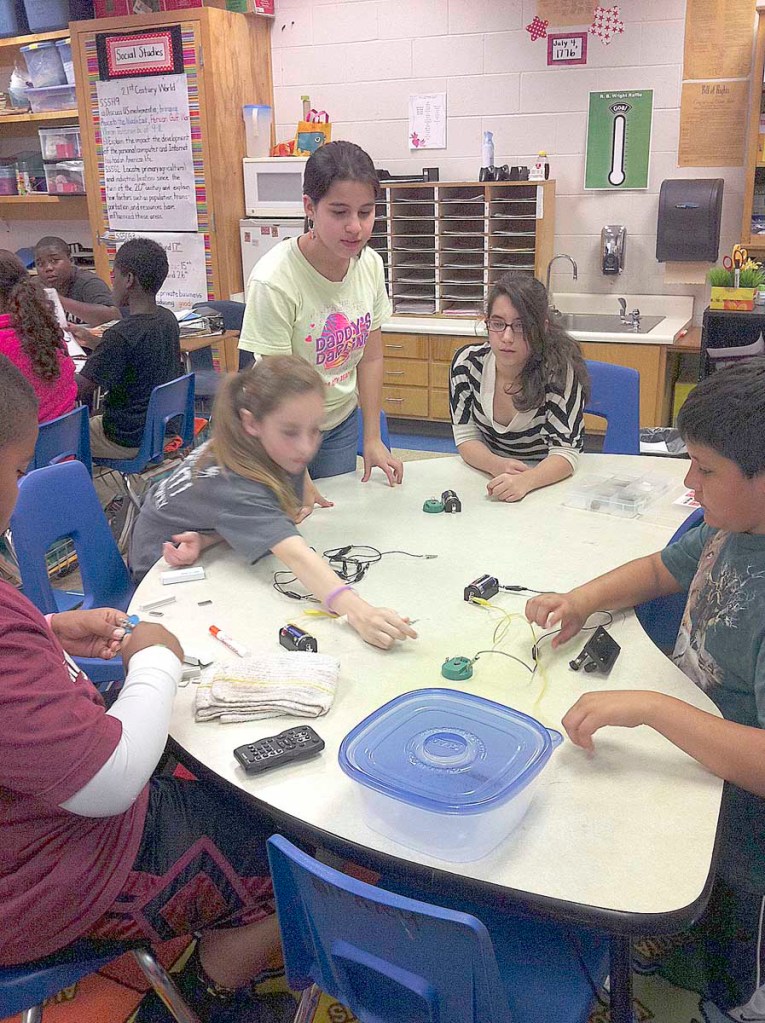Colquitt County teachers help study student interaction
Published 11:15 pm Tuesday, April 9, 2013

- Fifth graders Remon Young, Elli Whidby, Katherine Oro, Yaisary Miguel, and Zachary O’Kelley interact during discussion of their assignment in Bonnie Kirkley’s class at R.B. Wright Elementary School.
A generation ago, talking in class was against the rules. Now, four Colquitt County teachers are participating in a two-year study to see if that once-forbidden behavior could actually help kids learn.
Early results are promising, according to a press release from the University of Georgia’s College of Education, which is doing the research..
Bonnie Kirkley and Angie Roberts from R. B. Wright Elementary along with Leah Jordan from Cox Elementary and Kirsten Saunders from Hamilton Elementary in the Colquitt County School System are among 100 teachers from across the state who are participating in the study.
“Current instruction often fails to connect with immigrant children’s learning potential and doesn’t make the most of the cultural capital these children bring to our education system,” said Pedro Portes, executive director of the College of Education’s Center for Latino Achievement and Success in Education (CLASE).
The Instructional Conversation method involves encouraging students to discuss lessons, not just with their teachers but with each other. While the study is aimed at improving outcomes for students whose first language isn’t English, teachers find that the method helps all students.
Last year was a learning year for Saunders and Kirkley as they received support and training throughout the school year from Donna Thomas, CLASE instructional coach, on how to become facilitators in their classrooms as students participated in Instructional Conversations. They have continued to utilize the method this year with much success, according to a press release from the UGA CLASE.
Jordan and Roberts joined the program this year and have received the support of Thomas as their instructional coach. The method may be used with discussions in any subject matter as it assists teachers in understanding which students are grasping the material and which need more assistance.
Saunders said she recognizes the positive changes in her classroom since utilizing the IC method.
“I love the Instructional Conversation Model!” she said. “It has guided me in learning how to instruct not only my ELLs (English Language Learners), but all of my students, through learning from one another in small group discussions. The model encourages teaching through higher order questioning techniques. Students learn more through the small group conversations, and many youngsters are more open to talking and expressing their ideas in the small groups. Instructional Conversation has been an awesome addition in my classroom for the past two years.”
Roberts likes the fact that her classroom has become more student-centered.
“My students are talking to each other and learning from each other more,” she said. “I think it helps them learn responsibility and cooperation. Students also have an opportunity to share more of who they are with the class.”
“This has been a wonderful experience in which I am so thrilled to be a part of,” Jordan said. “My students have benefited so much from the use of Instructional Conversations. It is so exciting to walk around the classroom and hear conversations centered around the instruction that the students have received. It has definitely made a difference in my classroom — not only in the ways my students learn, but in the way I teach as well.”
The $2.9 million research project funded by the Institute of Education Sciences examines the effectiveness of the Instructional Conversation teaching method in improving English languages learners’ achievements toward Common Core standards.
Researchers are seeking a final group of teachers to commit to the two-year study. Teachers who participate are provided with $1,000 to $3,000 in compensation and trained in the method’s strategies. Teachers will receive weekly coaching and support for one year.
Any elementary school administrator, third- or fifth-grade teacher who is interested in participating in the project or who wants more information should contact Paula Mellom pjmellom@uga.edu at the University of Georgia’s Center for Latino Achievement and Success in Education. Teachers can sign up online at www.coe.uga.edu/clase/confirmation-of-interest-form/.





